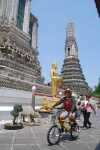Trip of lifetime takes Cottey students to Southeast Asia

Editor's note: Dr. Selena Kohel, assistant professor of psychology, and Professor Karen Polon from Cottey College led an alternative spring break trip to Thailand last month. Most years, Cottey offers an alternative trip to students for those who may want to go somewhere other than Europe. Dr. Kohel, who has family in Thailand, led this two-week trip for 17 Cottey students.
By Dr. Selena Kohel
Special to the Daily Mail

From March 10 to March 22, 17 students and two faculty members from Cottey College traveled to Thailand for a "trip of a lifetime," and a trip of a lifetime it was.
In preparation for the trip, the students learned about the Platinum Rule. While the Golden Rule states, "Do unto others as you wish to have done unto you," the Platinum Rule states, "Do unto others as they wish to have done unto them."
As faculty members, we wanted the students to practice empathy, to recognize the similarities and differences between Thai culture and their own cultures, to suspend judgment, to seek to understand, and then, to make informed decisions about how to act.

In particular, we asked students to focus on Thai culture, unsustainable/ sustainable tourism, and service. In this article, I address Thai culture. In articles to follow, I address unsustainable/sustainable tourism and service. Overall, I think we did pretty well.
Thailand literally means the land of the free. Thailand has never been colonized by a Western power and the diplomacy of various monarchs is credited with this fact. To reflect this, the Thai National Anthem is played in public areas twice a day, at 8 a.m. and 6 p.m., during which time people stop what they are doing and stand at attention. Our group had several opportunities to practice this cultural norm as we shopped along the Wua Lai and Thapae Walking Streets (Saturday and Sunday Markets) in Chiang Mai, where local goods are sold. Throughout Thailand, we also saw plentiful portraits of the current king, Bhumibol Adulyadej (interesting fact, the current king was born in the United States).
The Thai royal family is highly revered, as shown by the portraits, and to criticize the royal family --for example, showing the movie the King and I -- is punishable by law. Thankfully, our students showed proper reverence, as well, especially as we toured the Grand Palace in Bangkok, where royal ceremonies are still held.

Although there is no official religion, Thailand is largely a Buddhist society. Buddhist beliefs, practices, and traditions permeate Thai culture. Our group had the opportunity to learn about Buddhism and the importance of Buddhism in Thai society through visits to Wat Phra Kaew (Temple of the Emerald Buddha), Wat Pho (Temple of the Reclining Buddha), and Wat Arun (Temple of the Dawn) in Bangkok and Wat Phrathat Doi Suthep in Chiang Mai.
At Wat Phrathat Doi Suthep, we met with a Buddhist monk who shared with us basic principles of Buddhism and meditation. For the most part, while at the temples, our group members behaved appropriately. We covered up. We wore shirts with sleeves that covered our shoulders and skirts or pants that covered our knees.
We took off our shoes before entering; we stepped over thresholds (spirits are believed to live in thresholds); and when seated, we kept our feet tucked underneath us or to our side (feet are considered the most base part of the body; to point one's foot toward another is considered an insult, as is to elevate one's foot, especially above someone's head, as the head is considered the most sacred part of the body).
We posed appropriately with any Buddha images (rumor has it that tourists have been put in jail for sitting on a Buddha image).
Thailand is based on collectivistic principles. This includes sharing, considering others before yourself, and helping others save face.
Even though the U.S. dollar is worth considerably more than the Thai baht, we found ourselves being given things time and time again. While waiting for a train that would take us past villages, canals, and salt paddies to the town of Mahachai, we walked through a market area.
Upon asking vendors what various fruits were called, whole fruits were cut for our group members to try. The day before we left Thailand, while in Bangkok, it was discovered that one of our students had left her wallet in our last location, a five-hour drive away.
The owner of the resort at which we had stayed put the student's wallet on a public bus to Bangkok. As one of our tour guides, Khun Poe, took us to the airport for our return flight to Nevada, our other tour guide, Khun Toy, drove the hour and a half round trip to retrieve the wallet from Bangkok's Southern Bus Terminal.
Khun Poe approached me to let me know why Khun Toy was not accompanying us to the airport. He told me there was no need to assign blame, the problem was being addressed -- in essence, "mai bpen rai (there was no problem)."
Our group had a bit of difficulty enacting collectivistic principles, being as many of us come from a country based on individualistic principles. However, there were glimmers.
When asked at an outdoor market, one student found herself sharing her soda with a stranger, who might be perceived as a beggar and discarded in the United States.
In a villager's home in Baan Mae Kampong, after being served an amazing home-cooked meal, students cleared the dishes from the table and brought them to an unattached kitchen. The students did not need to be asked.
Lastly, but surely not last in importance, Thailand figuratively means the land of smiles. The Thai concept of "sunook (fun)" takes a primary importance. Thai people like to have fun, including "phuut len (playful speech)."
Our students taught students at Ratchapat Thonburi University how to make friendship bracelets and in exchange they taught us how to make "krathongs (banana leaf floats)" and carve decorative watermelons.
Although neither group spoke each other's language, it didn't take long for smiles and laughter to predominate the room. Two of our students, in particular, caught the attention of two Thai students who seemed to relentlessly tease them.
One of our students, Amanda, was one of our tallest students and one of the Thai students was one of their shortest. This could have had something to do with it.
As I heard the Thai student comment on Amanda's height, "suung (tall)," I responded with "thia (short)," to which the student replied with a smile, "mai thia; tua lek (I'm not short. I'm small)."
Students seemed to weather the teasing well. When some of us tried to help villagers at Baan Mae Kampong stuff tea leaves into pillowcases so they could make decorative pillows to sell, we were told if we didn't do a good enough job we would have to remain at the village until we got it right.
Thankfully, they didn't hold us to this.
Smiles begot smiles and laughter begot laughter.
